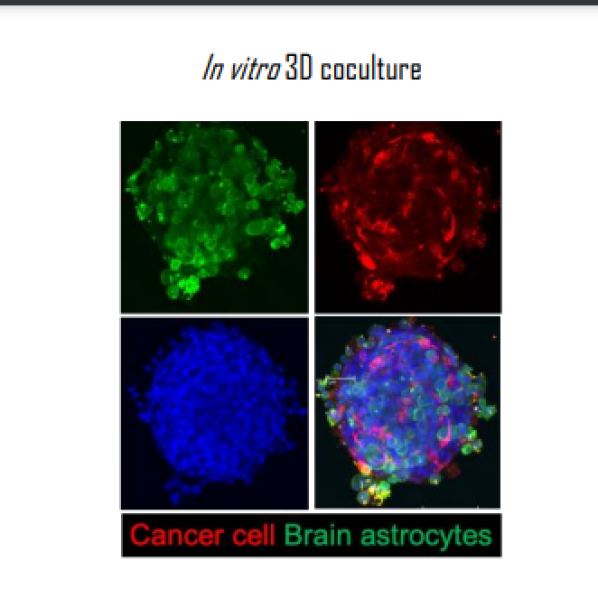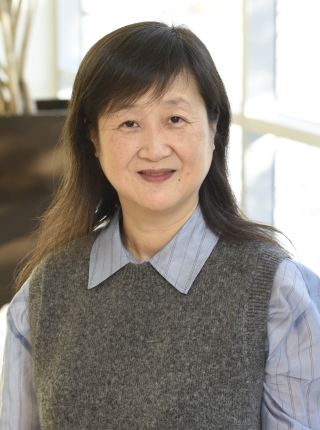
Breadcrumb
- Home
- Qing Chen
Qing Chen, MD, PhD

Associate Professor
Research Program
Lab Overview
Brain metastasis is the most ominous form of cancer relapse. Unfortunately, most cancer therapies have shown limited efficacy in brain metastasis. To form metastatic tumors, cancer cells need to survive and adapt to the microenvironment in distal organs. Due to the unique brain microenvironment, we consider brain metastasis as a different disease from extracranial tumors. Chen lab studies the complex interplay between the metastatic cancer cells and the unique brain cells. Our idea is that once we know how the brain microenvironment facilitates metastasis, we can focus our efforts on stopping it. Moreover, we are trying to understand how the standard cancer therapies change the brain stromal cells to facilitate the metastatic outgrowth. Overall, our research proposal aims to yield real and actionable targets on the brain microenvironment, instead of on cancer cells. The ultimate goal is to identify new therapeutic targets and increase the therapeutic efficacy in brain metastasis patients.
Educational Background
- Ph.D, Immunology, Roswell Park Cancer Institute, State University of New York at Buffalo, 2006
- M.D., Clinical Medicine, Capital University of Medical Sciences, Beijing, China, 1997
Memberships
- 2003- American Association for Cancer Research (AACR)
Honors & Awards
- Melanoma Research Program, U.S. Department of Defense, Idea Award 2023
- Tara Miller Melanoma Foundation Team Science Grant 2023
- V Foundation Award 2020
- Legacy of Hope Merit Award 2019
- The Jayne Koskinas Ted Giovanis Foundation for Health and Policy Award 2018
- Susan G. Komen Career Catalyst Award 2017
- The NCI Transition Career Development Award (K22CA181470-01) 2015
People
Research Interests
- Brain metastasis
- Tumor microenvironment
- Breast cancer Melanoma
- Novel therapeutic targets
- Preclinical brain metastasis models
Misc
Ongoing/Future Projects
- Immune microenvironment in brain metastasis
- Therapeutic responses in brain metastasis associated stromal cells
- Preconditioned brain microenvironment by primary tumors
- Spatial and temporal interactions between cancer and brain stromal cells
- Brain metastasis immunotherapies
- Brain metastasis PDX
Selected Publications
- Hlavaty SI, Salcido KN, Pniewski KA, Ma W, Kannan T, Mukha D, Liu Q, Kossenkov A, Chen Q, Zachary T. Schug ZT. ACSS1-dependent acetate utilization rewires mitochondrial metabolism to support AML and melanoma tumor growth and metastasis. Cell Reports 43, 114988. 2024
- Ma W*, Oswald J, Angulo AR, Chen Q*. Tmem119 is Downregulated in a Subset of Brain Metastasis-associated Microglia. BMC Neuroscience 25, 6, 2024. [*Shared corresponding-author]
- Ou L, Shujing Liu S, Wang H, Guo Y, Guan L, Shen L, Luo R, Elder DE, Huang AC, Karakousis G, Miura J, Mitchell T, Lynn Schuchter L, Amaravadi R, Flowers A, Mou H, Yi F, Guo W, Ko J, Chen Q, Tian B, Herlyn M, Xu X. Patient-derived melanoma organoid models facilitate the assessment of immunotherapies. eBioMedicine 92: 104614, 2023
- Ma W, Oliveira-Nunes MC, Ke Xu K, Kossenkov A, Hayden J, Chen Q. Type I Interferon Activation in Astrocytes Facilitates Brain Metastasis via CCL2-Mediated Myeloid cell Recruitment. Nature Communications 14:2632, 2023
- Stejerean-Todoran I., Gimotty PA, Watters A, Brafford P, Krepler C, Godok T, Li H, Bonilla del Rio Z, Zieseniss A, Dörthe M. Katschinski DM, Sinem M. Sertel SM, Silvio O. Rizzoli SO, Garman B, Katherine L. Nathanson KL, Xu X, Chen Q, Oswald JH, Lotem M, Mills BM, Davies MA, Schön MP, Bogeski I, Herlyn M, Vultur A. A distinct pattern of growth and RAC1 signaling in melanoma brain metastasis cells. Neuro-Oncology noac212, 2022
- Parris JLD, Barnoud T, Leu JI, Leung JC, Ma W, Kirven N, Kossenkov AV, Liu Q, George DLG, Weeraratna AT, Chen Q, Murphy ME (2021). HSP70 inhibition blocks adaptive resistance and synergizes with MEK inhibition for the treatment of NRAS mutant melanoma. Cancer Research Communications 1:17, 2021
- Zou Y, Watters A, Cheng C, Perry CE, Xu K, Alicea GM, Parris JLD, Baraban E, Ray P, Nayak A, Xu X, Herlyn M, Murphy ME, Weeraratna AT, Schug ZT, Chen Q. Polyunsaturated Fatty Acids from Astrocytes Activates PPAR Gamma Signaling in Cancer Cells to Promote Brain Metastasis. Cancer Discovery 9:1720, 2019
- Basu S, Gnanapradeepan K, Barnoud T, Kung CP, Tavecchio M, Scott J, Watters A, Chen Q, Kossenkov AV, Murphy ME. Genes Dev. 32:230, 2018
- Chen Q*, Boire A*, Jin X, Valiente M, Er EE, Lopez-Soto A, Jacob L, Patwa R, Shah H, Xu K, Cross JR, Massagué J. Carcinoma-astrocyte gap junctions promote brain metastasis by cGAMP transfer. Nature 533:493, 2016. [*Shared first-author]
- Valiente M, Obenhauf A, Jin X, Chen Q, Zhang XH, Lee D, Chaft JE, Kris MG, Huse JT, Brogi E, Massagué J. Serpins shield brain metastatic cells from death signals and vascular detachment. Cell 156:1002, 2014
- Chen Q, Zhang XH, Massagué J. VCAM1 mediates survival of breast cancer cells on arrival in the lungs. Cancer Cell 20:538, 2011.
Open Positions
About the Position
The Chen laboratory at the Fox Chase Cancer Center Cancer, Signaling and Microenvironment Program has openings for a Post-Doctoral Fellow.
We study cancer metastasis, particularly the spread of cancer cells from their original site to the brain. The laboratory employs multi-disciplinary approaches to understand the interactions between metastatic cancer cells and the brain stromal cells. The goal of the research projects is to obtain the mechanistic insights into the metastatic process in the unique brain microenvironment, from which potential therapeutic targets can be identified to control brain metastases.
We are seeking highly motivated and enthusiastic postdoctoral fellows who have recently received a PhD (or equivalent) degree or be close to obtaining their doctoral degree, with a strong background in cancer biology, neurobiology, immunology, or related fields.
The postdocs will employ our well-established in vitro 3D culture, in vivo mouse models and state-of-art intravital imaging in the research projects. The projects will require the applications of advanced cellular, molecular and histological techniques; innovated spatial transcriptomics and single cell RNA-Seq; and bioinformatics analyses. The Chen lab collaborates with basic and clinical research investigators within Fox Chase and Temple Health, as well as University of Pennsylvania and The Wistar Institute. The successful candidates will have opportunities for professional development in a dynamic and collaborative academic environment.
About the Training Environment
As one of the four original cancer centers to receive comprehensive designation from the National Cancer Institute, Fox Chase Cancer Center has been at the forefront of cancer research for almost 90 years. We are home to excellent research facilities, top clinicians and scientists, and outstanding patient care. Our singular focus on cancer, which couples discovery science with state of the art clinical care and population health, remains the foundation of our work.
The scientist training programs at Fox Chase Cancer Center provide professional development opportunities in four core areas identified as crucial for successful careers in science, research, and health care including communication, leadership, teaching, and mentorship. Upon joining the program, graduate students and postdocs develop individual development plans to help guide their growth. Training throughout the year is supplemented with free professional development opportunities, including a robust ‘How To’ series, writing courses, networking, mentorship, and teaching opportunities, a trainee-led seminar series, a trainee-led annual Research Conference, and more. Postdocs at Fox Chase Cancer Center are supported by the Temple University Postdoc Association and the Office of Academic Affairs at Fox Chase, and are compensated with competitive pay and benefits.
In addition to the robust training program, scientists at Fox Chase Cancer Center benefit from being part of the rich scientific and biotech environment in the Philadelphia region. Many of our former trainees are now employees (and contacts) at nearby institutions and companies, including The Wistar Institute, Merck, GSK, AACR, and numerous others.
To Apply
Interested applicants should submit a cover letter that states research interest(s) and goals, curriculum vitae, and a list of three references to Dr. Qing Chen via e-mail at [email protected].
The following ratings and reviews are based on verified feedback collected from independently administered patient experience surveys. The ratings and comments submitted by patients reflect their own views and opinions. Patient identities are withheld to ensure confidentiality and privacy. Learn more about our Patient Experience Ratings.
Ratings Breakdown
Share
-
Share with Facebook
-
Share with twitter
-
Share with email
-
Print this





Patient comments